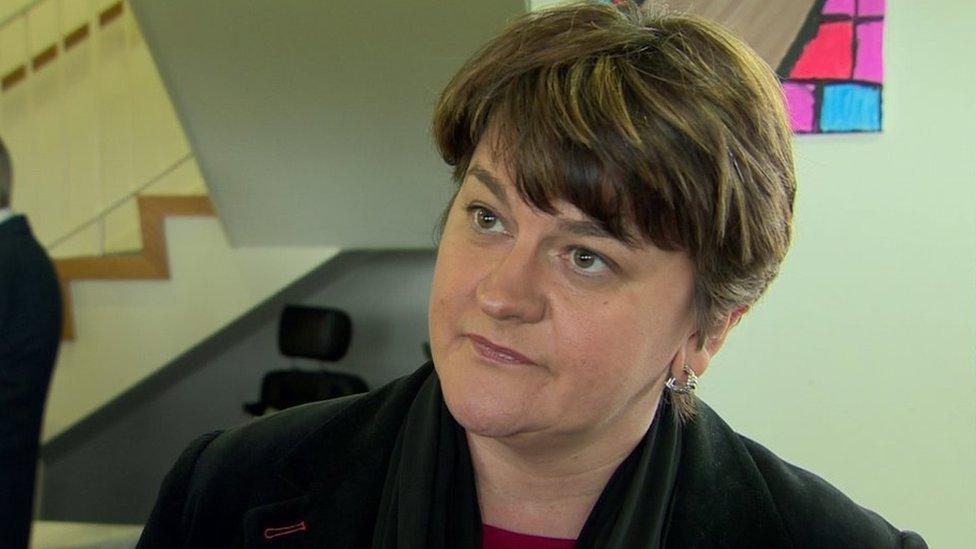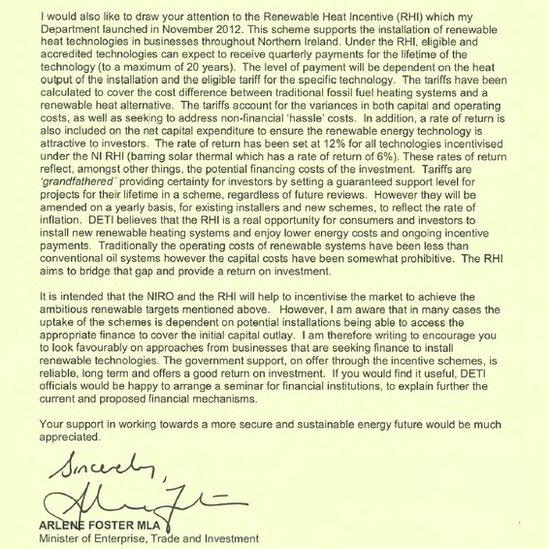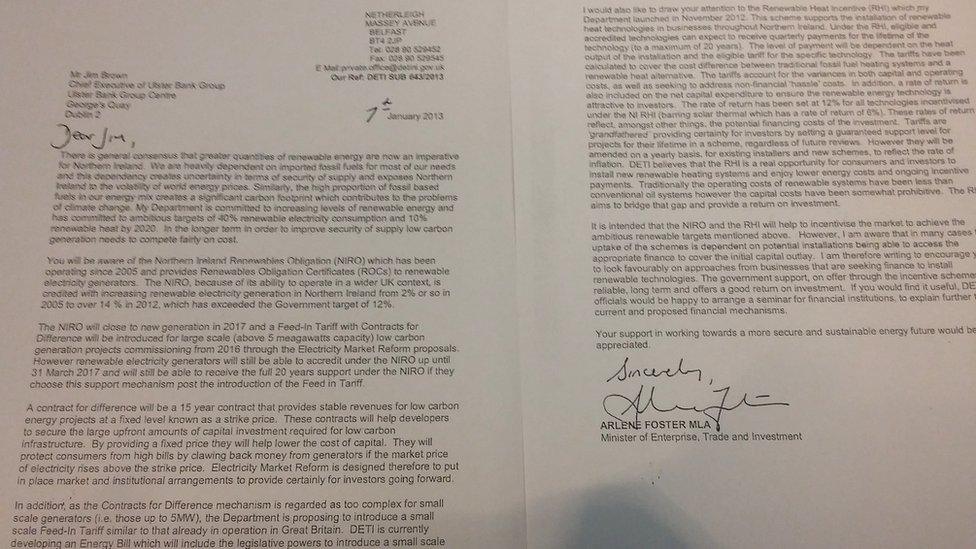RHI scandal: Arlene Foster encouraged banks to support scheme
- Published

First Minister Arlene Foster set up the botched renewable heat incentive (RHI) scheme in 2012, when she was Stormont's minister for enterprise
The first minister faces a renewed call to resign after it was revealed she wrote to banks encouraging support for the Renewable Heat Incentive scheme.
Arlene Foster was enterprise minister when she set up the botched RHI scheme in 2012.
A lack of cost controls left taxpayers facing an unexpected £490m bill.
Sinn Féin, the UUP and SDLP have called on Mrs Foster to step down after her Democratic Unionist Party released RHI letters she wrote to banks in 2013.
Mrs Foster has been criticised over the scheme's over-generous subsidies, which were greater than the cost of the fuel and meant the more claimants burned, the more public money they could earn.
'Guaranteed support'
In her letter to the Ulster Bank, dated 7 January 2013, Mrs Foster said she was "writing to encourage you to look favourably on approaches from businesses that are seeking finance to install renewable technologies".
"The government support, on offer through the incentive schemes, is reliable, long term and offers a good return on investment."

A copy of the letter Arlene Foster sent to banks in 2013 has been released by the Department for Economy
Her letter also added: "Tariffs are 'grandfathered' providing certainty for investors by setting a guaranteed support level for projects for their lifetime in a scheme, regardless of future reviews."
'Leaked'
The existence of Mrs Foster's RHI letters to banks was reported by the Sunday World, but their contents were not public knowledge until her correspondence was released to the News Letter by the DUP on Thursday. , external
Ulster Unionist Party (UUP) leader Mike Nesbitt said his party had asked that the letters be released under a Freedom of Information request and he claimed the correspondence "now appears to have been leaked by the DUP".
Mr Nesbitt said Mrs Foster had played a "central role" in setting up the RHI scheme and accused her of "incompetence".
"Aside from the important question of the propriety of the DUP releasing government papers, the letter makes clear that Mrs Foster was across every important detail, or 'jot and tittle' of RHI, and wrote to the banks to inform them that in terms of the 20 years of the RHI subsidy, the only way was up, in that the levels were guaranteed to be adjusted only to account for inflation."

The News Letter published a copy of the letter it obtained from the DUP on Thursday
The health minister, Michelle O'Neill of Sinn Féin, called on the first minister to "stand aside to facilitate an independent investigation" into the RHI scheme.
"Revelations that Arlene Foster had written to banks asking them to support the RHI scheme is further evidence of the need for an independent, time-framed, robust and transparent investigation into the whole RHI debacle," she added.
"That investigation should be undertaken by an independent judicial figure from outside this jurisdiction and be appointed by the Attorney General.
"Arlene Foster should stand aside to facilitate that judicial led investigation until it brings forward a preliminary report.
"This is what is required to restore public confidence in the assembly and the political institutions."
SDLP leader Colum Eastwood also urged Mrs Foster to "stand aside" as first minister, pending a public inquiry into the RHI scheme.
"I am again urging the first minister - abide by the will of the assembly," he said.
"Listen to the will of the public. Stand aside and begin to restore faith in our institutions."
Traditional Unionist Voice (TUV) leader Jim Allister said: "With the release of the 7th January 2013 letters to banks from Arlene Foster, it turns out Mrs Foster was actively promoting the scheme with banks so that they would lend to those installing RHI boilers.
"This points to a far greater ministerial attachment to this scheme than hitherto has been admitted.
"Moreover, as these letters stressed the long term security of the tariffs - guaranteeing the tariffs would be exempt from downward movement - it further underscores ministerial knowledge and satisfaction with that situation - to the detriment of the taxpayer."
Mr Allister added that the need for a "full judicial inquiry is more imperative than ever".
'Misunderstanding'
In a statement on Friday, a spokesman for the Department for Economy said that when Mrs Foster wrote to the banks in January 2013, the statement about the non-domestic RHI "was entirely consistent with the department's [DETI] then understanding, ie. that the rate of return would be at a level of 12%.
"At that time, the department [DETI] had not recognised the much higher rate of return due to a misunderstanding that the tariff was lower than the market price.
"Indeed, action to encourage uptake was being considered as there was an underspend. Such action, including the letters to the banks, would have been entirely reasonable and appropriate, but for the design flaws in the scheme which had not been recognised by DETI at the time when these letters issued."
- Published23 December 2016

- Published7 November 2017
